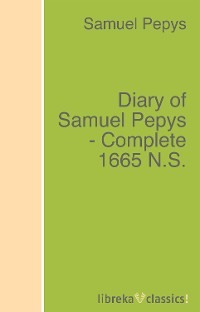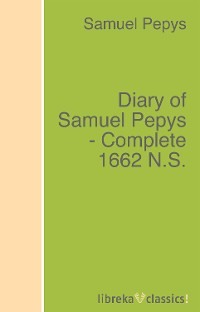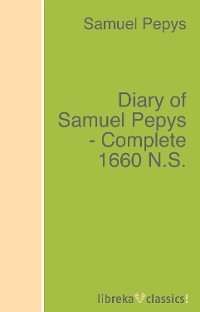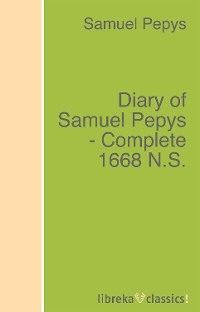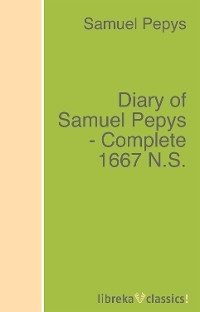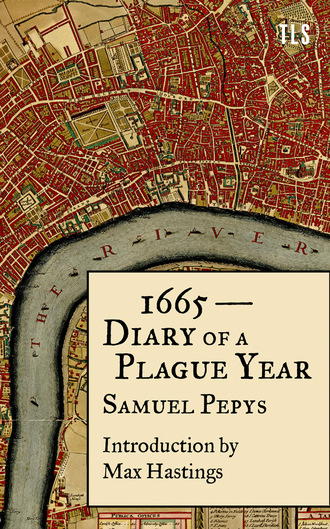
1665 – Diary of a Plague Year
which is so pretty that I presently bespoke it, and away home to the office, where we met to do something, and then though very late by coach to Sir Philip Warwicke’s, but having company with him could not speak with him. So back again home, where thinking to be merry was vexed with my wife’s having looked out a letter in Sir Philip Sidny about jealousy for me to read, which she industriously and maliciously caused me to do, and the truth is my conscience told me it was most proper for me, and therefore was touched at it, but took no notice of it, but read it out most frankly. But it stuck in my stomach, and moreover I was vexed to have a dog brought to my house to lime our little bitch, which they make him do in all their sights, which, God forgive me, do stir my jealousy again, though of itself the thing is a very immodest sight. However, to cards with my wife a good while, and then to bed.
3rd. Up, and by coach to Sir Philip Warwicke’s, the street being full of footballs, it being a great frost, and found him and Mr. Coventry walking in St. James’s Park. I did my errand to him about the felling of the King’s timber in the forests, and then to my Lord of Oxford, Justice in Eyre, for his consent thereto, for want whereof my Lord Privy Seal stops the whole business. I found him in his lodgings, in but an ordinary furnished house and room where he was, but I find him to be a man of good discreet replys. Thence to the Coffee-house, where certain news that the Dutch have taken some of our colliers to the North; some say four, some say seven. Thence to the ’Change a while, and so home to dinner and to the office, where we sat late, and then I to write my letters. Then to Sir W. Batten’s, who is going out of town to Harwich tomorrow to set up a light-house there, which he has lately got a patent from the King to set up, that will turn much to his profit. Here very merry, and so to my office again, where very late, and then home to supper and to bed, but sat up with my wife at cards till past two in the morning.
4th. Lay long, and then up and to my Lord of Oxford’s, but his Lordship was in bed at past 10 o’clock: and, Lord help us! so rude a dirty family I never saw in my life. He sent me out word my business was not done, but should [be] against the afternoon. I thence to the Coffee-house, there but little company, and so home to the ’Change, where I hear of some more of our ships lost to the Northward. So to Sir W. Batten’s, but he was set out before I got thither. I sat long talking with my Lady, and then home to dinner. Then came Mr. Moore to see me, and he and I to my Lord of Oxford’s; but not finding him within, Mr. Moore and I to “Love in a Tubb,” which is very merry, but only so by gesture, not wit at all, which methinks is beneath the House. So walked home, it being a very hard frost, and I find myself as heretofore in cold weather to begin to burn within and pimples and pricks all over my body, my pores with cold being shut up. So home to supper and to cards and to bed.
5th. Up, it being very cold and a great snow and frost tonight. To the office, and there all the morning. At noon dined at home, troubled at my wife’s being simply angry with Jane, our cook-maid (a good servant, though perhaps has faults and is cunning), and given her warning to be gone. So to the office again, where we sat late; and then I to my office, and there very late doing business. Home to supper and to the office again, and then late home to bed.
6th. Lay long in bed, but most of it angry and scolding with my wife about her warning Jane our cook-maid to be gone – and upon that she desires to go abroad today to look a place. A very good maid she is and fully to my mind, being neat, only they say a little apt to scold, but I hear her not. To my office all the morning busy. Dined at home. To my office again, being pretty well reconciled to my wife, which I did desire to be, because she had designed much mirth today to end Christmas with among her servants. At night home, being twelfenight, and there chose my piece of cake, but went up to my viall, and then to bed, leaving my wife and people up at their sports, which they continue till morning, not coming to bed at all.
7th. Up and to the office all the morning. At noon dined alone, my wife and family most of them a-bed. Then to see my Lady Batten and sit with her a while, Sir W. Batten being out of town; and then to my office doing very much business very late, and then home to supper and to bed.
8th (Lord’s day). Up betimes, and it being a very fine frosty day, I and my boy walked to White-hall, and there to the Chapel – where one Dr. Beaumont preached a good sermon, and afterwards a brave anthem upon the 150 Psalm, where upon the word “trumpet” very good music was made. So walked to my Lady’s and there dined with her (my boy going home), where much pretty discourse, and after dinner walked to Westminster, and there to the house where Jane Welsh had appointed me; but it being sermon time, they would not let me in, and said nobody was there to speak with me. I spent the whole afternoon walking into the Church and Abbey, and up and down, but could not find her, and so in the evening took a coach and home, and there sat discoursing with my wife, and by and by at supper, drinking some cold drink I think it was, I was forced to go make water and had very great pain after it; but was well by and by and continued so, it being only I think from the drink, or from my straining hard at stool to do more than my body would. So after prayers to bed.
9th. Up, and walked to White-hall, it being still a brave frost, and I in perfect good health, blessed be God! In my way saw a woman that broke her thigh, in her heels slipping up upon the frosty street. To the Duke, and there did our usual work. Here I saw the Royal Society bring their new book, wherein is nobly writ their Charter’ and laws, and comes to be signed by the Duke as a Fellow; and all the Fellows’ hands are to be entered there, and lie as a monument; and the King has put his with the word Founder. Thence I to Westminster, to my barber’s, and found occasion to see Jane, but in presence of her mistress, and so could not speak to her of her failing me yesterday, and then to the Swan to Herbert’s girl, and lost time a little with her. And so took coach, and to my Lord Crew’s and dined with him, who receives me with the greatest respect that could be, telling me that he do much doubt of the success of this war with Holland, we going about it, he doubts, by the instigation of persons that do not enough apprehend the consequences of the danger of it, and therein I do think with him. Holmes was this day sent to the Tower, – [For taking New York from the Dutch.] – but I perceive it is made matter of jest only. But if the Dutch should be our masters, it may come to be of earnest to him, to be given over to them for a sacrifice, as Sir W. Rawly [Raleigh] was. Thence to White-hall to a Tangier Committee, where I was accosted and most highly complimented by my Lord Bellasses,
[John Belasyse, second son of Thomas, first Viscount Fauconberg, created Baron Belasyse of Worlaby, January 27th, 1644, Lord Lieutenant of the East Riding of Yorkshire, and Governor of Hull. He was appointed Governor of Tangier, and Captain of the Band of Gentlemen Pensioners. He was a Roman Catholic, and therefore was deprived of all his appointments in 1672 by the provisions of the Test Act, but in 1684 James II made him First Commissioner of the Treasury. He died 1689.]
our new governor, beyond my expectation, or measure I could imagine he would have given any man, as if I were the only person of business that he intended to rely on, and desires my correspondence with him. This I was not only surprised at, but am well pleased with, and may make good use of it. Our patent is renewed, and he and my Lord Berkeley and Sir Thomas Ingram put in as commissioners. Here some business happened which may bring me some profit. Thence took coach and calling my wife at her tailor’s (she being come this afternoon to bring her mother some apples, neat’s tongues and brain); I home, and there at my office late with Sir W. Warren, and had a great deal of good discourse and counsel from him, which I hope I shall take, being all for my good in my deportment in my office, yet with all honesty. He gone I home to supper and to bed.
10th. Lay long, it being still very cold, and then to the office, where till dinner, and then home; and by and by to the office, where we sat and were very late, and I writing letters till twelve at night, and then after supper to bed.
11th. Up, and very angry with my boy for lying long a-bed and forgetting his lute. To my office all the morning. At noon to the ’Change, and so home to dinner. After dinner to Gresham College to my Lord Bruncker and Commissioner Pett, taking, Mr. Castle with me there to discourse over his draught of a ship he is to build for us. Where I first found reason to apprehend Commissioner Pett to be a man of an ability extraordinary in any thing, for I found he did turn and wind Castle like a chicken in his business, and that most pertinently and master-like, and great pleasure it was to me to hear them discourse, I of late having studied something thereof, and my Lord Bruncker is a very able person also himself in this sort of business, as owning himself to be a master in the business of all lines and Conicall Sections. Thence home, where very late at my office doing business to my content, though [God] knows with what ado it was that when I was out I could get myself to come home to my business, or when I was there, though late, could stay there from going abroad again. To supper and to bed. This evening, by a letter from Plymouth, I hear that two of our ships, the Leopard and another in the Straits, are lost by running aground, and that three more had like to have been so, but got off, whereof Captain Allen one – and that a Dutch fleet are gone thither; which if they should meet with our lame ships, God knows what would become of them. This I reckon most sad news; God make us sensible of it! This night, when I come home, I was much troubled to hear my poor canary bird, that I have kept these three or four years, is dead.
12th. Up, and to White-hall about getting a privy seal for felling of the King’s timber for the navy, and to the Lords’ House to speak with my Lord Privy Seal about it; and so to the ’Change, where to my last night’s ill news I met more. Spoke with a Frenchman who was taken, but released, by a Dutch man-of-war of thirty-six guns (with seven more of the like or greater ships), off the North Foreland, by Margetts [Margate] – which is a strange attempt, that they should come to our teeth. But the wind being easterly, the wind that should bring our force from Portsmouth will carry them away home. God preserve us against them, and pardon our making them in our discourse so contemptible an enemy! So home and to dinner, where Mr. Hollyard with us dined. So to the office, and there late till 11 at night and more, and then home to supper and to bed.
13th. Up betimes and walked to my Lord Bellasses’s lodgings in Lincoln’s Inn Fields, and there he received and discoursed with me in the most respectful manner that could be, telling me what a character of my judgement, and care, and love to Tangier he had received of me, that he desired my advice and my constant correspondence, which he much valued, and in my courtship, in which, though I understand his design very well, and that it is only a piece of courtship, yet it is a comfort to me that I am become so considerable as to have him need to say that to me, which, if I did not do something in the world, would never have been. Here well satisfied I to Sir Philip Warwicke, and there did some business with him; thence to Jervas’s and there spent a little idle time with him, his wife, Jane, and a sweetheart of hers. So to the Hall awhile and thence to the Exchange, where yesterday’s news confirmed, though in a little different manner; but a couple of ships in the Straits we have lost, and the Dutch have been in Margaret [Margate] Road. Thence home to dinner and so abroad and alone to the King’s house, to a play, “The Traytor,” where, unfortunately, I met with Sir W. Penn, so that I must be forced to confess it to my wife, which troubles me. Thence walked home, being ill-satisfied with the present actings of the House, and prefer the other House before this infinitely. To my Lady Batten’s, where I find Pegg Penn, the first time that ever I saw her to wear spots. Here very merry, Sir W. Batten being looked for tonight, but is not yet come from Harwich. So home to supper and to bed.
14th. Up, and to White-hall, where long waited in the Duke’s chamber for a Committee intended for Tangier, but none met, and so I home and to the office, where we met a little, and then to the ’Change, where our late ill news confirmed in loss of two ships in the Straits, but are now the Phoenix and Nonsuch! Home to dinner, thence with my wife to the King’s house, there to see “Vulpone,” a most excellent play; the best I think I ever saw, and well, acted. So with Sir W. Penn home in his coach, and then to the office. So home, to supper, and bed, resolving by the grace of God from this day to fall hard to my business again, after some, a week or fortnight’s, neglect.
15th (Lord’s day). Up, and after a little at my office to prepare a fresh draft of my vows for the next year, I to church, where a most insipid young coxcomb preached. Then home to dinner, and after dinner to read in “Rushworth’s Collections” about the charge against the late Duke of Buckingham, in order to the fitting me to speak and understand the discourse anon before the King about the suffering the Turkey merchants to send out their fleet at this dangerous time, when we can neither spare them ships to go, nor men, nor King’s ships to convoy them. At 4 o’clock with Sir W. Penn in his coach to my Lord Chancellor’s, where by and by Mr. Coventry, Sir W. Penn, Sir J. Lawson, Sir G. Ascue, and myself were called in to the King, there being several of the Privy Council, and my Lord Chancellor lying at length upon a couch (of the goute I suppose); and there Sir W. Penn begun, and he had prepared heads in a paper, and spoke pretty well to purpose, but with so much leisure and gravity as was tiresome; besides, the things he said were but very poor to a man in his trade after a great consideration. But it was to purpose, indeed to dissuade the King from letting these Turkey ships to go out: saying (in short) the King having resolved to have 130 ships out by the spring, he must have above 20 of them merchantmen – towards which, he in the whole River could find but 12 or 14, and of them the five ships taken up by these merchants were a part, and so could not be spared. That we should need 30,000 [sailors] to man these 130 ships, and of them in service we have not above 16,000; so we shall need 14,000 more. That these ships will with their convoys carry above 2,000 men, and those the best men that could be got, it being the men used to the Southward that are the best men for war, though those bred in the North among the colliers are good for labour. That it will not be safe for the merchants, nor honourable for the King, to expose these rich ships with his convoy of six ships to go, it not being enough to secure them against the Dutch, who, without doubt, will have a great fleet in the Straits. This, Sir J. Lawson enlarged upon. Sir G. Ascue, he chiefly spoke that the war and trade could not be supported together, and, therefore, that trade must stand still to give way to them. This Mr. Coventry seconded, and showed how the medium of the men the King has one year with another employed in his Navy since his coming, has not been above 3,000 men, or at most 4,000 men; and now having occasion of 30,000, the remaining 26,000 must be found out of the trade of the nation. He showed how the cloaths, sending by these merchants to Turkey, are already bought and paid for to the workmen, and are as many as they would send these twelve months or more; so the poor do not suffer by their not going, but only the merchant, upon whose hands they lie dead; and so the inconvenience is the less. And yet for them he propounded: either the King should, if his Treasure would suffer it, buy them, and showed the loss would not be so great to him – or dispense with the Act of Navigation, and let them be carried out by strangers; and ending that he doubted not but when the merchants saw there was no remedy, they would and could find ways of sending them abroad to their profit. All ended with a conviction (unless future discourse with the merchants should alter it) that it was not fit for them to go out, though the ships be loaded. The King in discourse did ask me two or three questions about my news of Allen’s loss in the Straits, but I said nothing as to the business, nor am not much sorry for it, unless the King had spoke to me as he did to them, and then I could have said something to the purpose I think. So we withdrew, and the merchants were called in. Staying without, my Lord Fitzharding come thither, and fell to discourse of Prince Rupert, and made nothing to say that his disease was the pox and that he must be fluxed, telling the horrible degree of the disease upon him with its breaking out on his head. But above all I observed how he observed from the Prince that courage is not what men take it to be, a contempt of death; “For,” says he, “how chagrined the Prince was the other day when he thought he should die, having no more mind to it than another man. But,” says he, “some men are more apt to think they shall escape than another man in fight, while another is doubtful he shall be hit. But when the first man is sure he shall die, as now the Prince is, he is as much troubled and apprehensive of it as any man else. For,” says he, “since we told him that we believe he would overcome his disease, he is as merry, and swears and laughs and curses, and do all the things of a [man] in health, as ever he did in his life” – which, methought, was a most extraordinary saying before a great many persons there of quality. So by and by with Sir W. Penn home again, and after supper to the office to finish my vows, and so to bed.
16th. Up, and with Sir W. Batten and Sir W. Penn to White-hall, where we did our business with the Duke. Thence I to Westminster Hall and walked up and down. Among others Ned Pickering met me and tells me how active my Lord is at sea, and that my Lord Hinchingbroke is now at Rome, and, by all reports, a very noble and hopeful gentleman. Thence to Mr. Povy’s, and there met Creed, and dined well after his old manner of plenty and curiosity. But I sat in pain to think whether he would begin with me again after dinner with his enquiry after my bill, but he did not, but fell into other discourse, at which I was glad, but was vexed this morning, meeting of Creed, at some bye-questions that he demanded of me about some such thing, which made me fear he meant that very matter, but I perceive he did not. Thence to visit my Lady Sandwich; and so to a Tangier Committee, where a great company of the new Commissioners, Lords, that in behalf of my Lord Bellasses are very loud and busy and call for Povy’s accounts; but it was a most sorrowful thing to see how he answered to questions so little to the purpose, but to his own wrong. All the while I sensible how I am concerned in my bill of £100 and somewhat more. So great a trouble is fear, though in a case that at the worst will bear enquiry. My Lord Berkeley was very violent against Povy. But my Lord Ashly, I observe, is a most clear man in matters of accounts, and most ingeniously did discourse and explain all matters. We broke up, leaving the thing to a Committee of which I am one. Povy, Creed, and I stayed discoursing, I much troubled in mind seemingly for the business, but indeed only on my own behalf, though I have no great reason for it, but so painful a thing is fear. So after considering how to order business, Povy and I walked together as far as the New Exchange and so parted, and I by coach home. To the office a while, then to supper and to bed. This afternoon Secretary Bennet read to the Duke of York his letters, which say that Allen
[Among the State Papers is a letter from Captain Thomas Allin to Sir Richard Fanshaw, dated from “The Plymouth, Cadiz Bay,” December 25th, 1664, in which he writes: “On the 19th attacked with his seven ships left, a Dutch fleet of fourteen, three of which were men-of-war; sunk two vessels and took two others, one a rich prize from Smyrna; the others retired much battered. Has also taken a Dutch prize laden with iron and planks, coming from Lisbon” (“Calendar,” Domestic, 1664–65, p. 122).]
has met with the Dutch Smyrna fleet at Cales, – [The old form of the name Cadiz.] – and sunk one and taken three. How true, or what these ships are, time will show; but it is good news – and the news of our ships being lost is doubted at Cales and Malaga. God send it false!
17th. Up, and walked to Mr. Povy’s by appointment, where I found him and Creed busy about fitting things for the Committee; and thence we to my Lord Ashly’s, where, to see how simply, beyond all patience, Povy did again, by his many words and no understanding, confound himself and his business, to his disgrace, and rendering everybody doubtful of his being either a fool or a knave, is very wonderful. We broke up, all dissatisfied, and referred the business to a meeting of Mr. Sherwin and others to settle, but here it was mighty strange methought to find myself sit here in Committee with my hat on, while Mr. Sherwin stood bare as a clerk, with his hat off to his Lord Ashly and the rest, but I thank God I think myself never a whit the better man for all that. Thence with Creed to the ’Change and Coffee-house, and so home, where a brave dinner, by having a brace of pheasants and very merry about Povy’s folly. So anon to the office, and there sitting very late; and then after a little time at Sir W. Batten’s, where I am mighty great, and could, if I thought it fit, continue so, I to my office again, and there very late, and so home to the sorting of some of my books, and so to bed, the weather becoming pretty warm, and I think and hope the frost will break.
18th. Up, and by and by to my bookseller’s, and there did give thorough direction for the new binding of a great many of my old books, to make my whole study of the same binding, within very few. Thence to my Lady Sandwich’s, who sent for me this morning. Dined with her, and it was to get a letter of hers conveyed by a safe hand to my Lord’s own hand at Portsmouth, which I did undertake. Here my Lady did begin to talk of what she had heard concerning Creed, of his being suspected to be a fanatic and a false fellow. I told her I thought he was as shrewd and cunning a man as any in England, and one that I would fear first should outwit me in anything – to which she readily concurred. Thence to Mr. Povy’s by agreement, and there with Mr. Sherwin, Auditor Beale, and Creed and I hard at it very late about Mr. Povy’s accounts, but such accounts I never did see, or hope again to see in my days. At night, late, they gone, I did get him to put out of this account our sums that are in posse only yet, which he approved of when told, but would never have stayed it if I had been gone. Thence at 9 at night home, and so to supper vexed and my head aching and to bed.
19th. Up, and it being yesterday and today a great thaw, it is not for a man to walk the streets, but took coach and to Mr. Povy’s, and there meeting all of us again agreed upon an answer to the Lords by and by, and thence we did come to Exeter House, and there was a witness of most [base] language against Mr. Povy, from my Lord Peterborough, who is most furiously angry with him, because the other, as a fool, would needs say that the £26,000 was my Lord Peterborough’s account, and that he had nothing to do with it. The Lords did find fault also with our answer, but I think really my Lord Ashly would fain have the outside of an Exchequer, – [This word is blotted, and the whole sentence is confused.] – but when we come better to be examined. So home by coach, with my Lord Berkeley, who, by his discourse, I find do look upon Mr. Coventry as an enemy but yet professes great justice and pains. At home, after dinner to the office, and there sat all the afternoon and evening; and then home to supper and to bed. Memorandum: This day and yesterday, I think it is the change of the weather, I have a great deal of pain, but nothing like what I use to have. I can hardly keep myself loose, but on the contrary am forced to drive away my pain. Here I am so sleepy I cannot hold open my eyes, and therefore must be forced to break off this day’s passages more shortly than I would and should have done. This day was buried (but I could not be there) my cousin Percivall Angier; and yesterday I received the news that Dr. Tom Pepys is dead, at Impington, for which I am but little sorry, not only because he would have been troublesome to us, but a shame to his family and profession; he was such a coxcomb.


